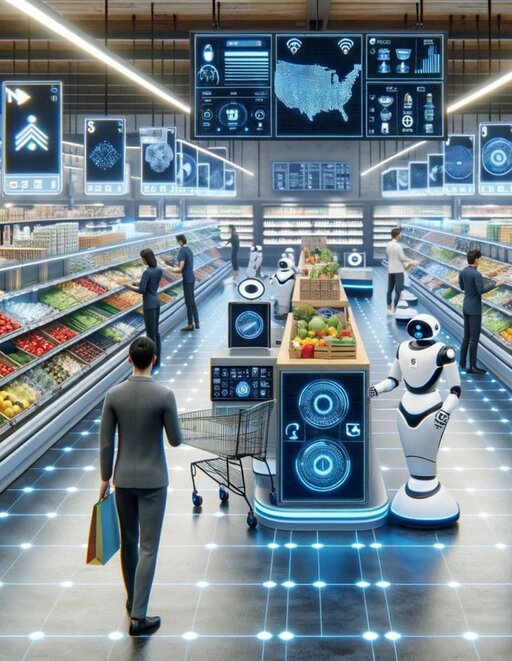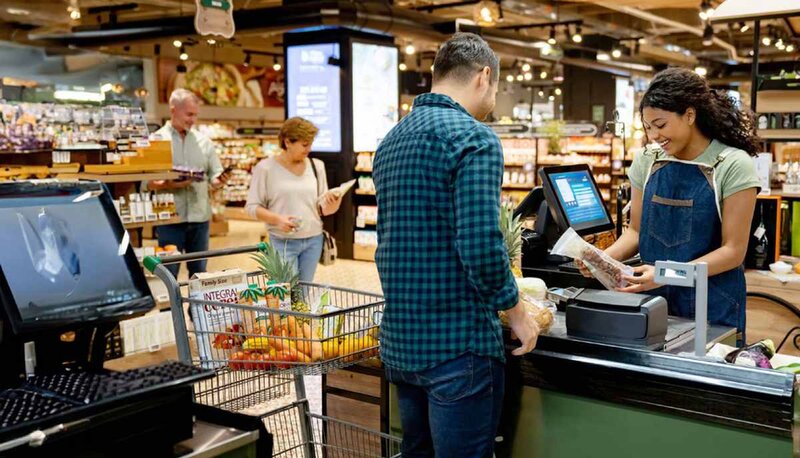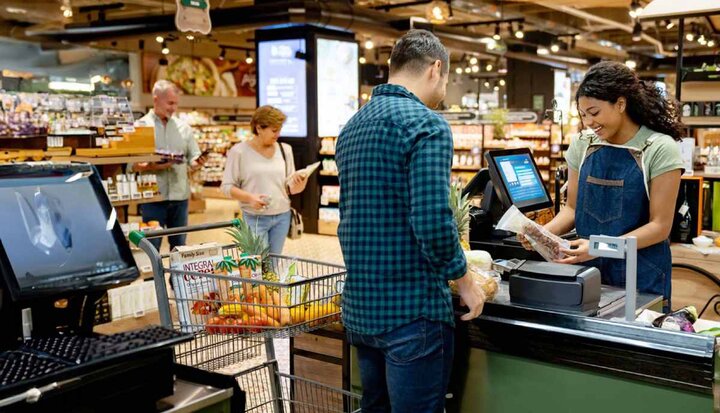

Integrating AI with the Grocery Store Retail Experience: A Strategic Approach for Grocers
By integrating artificial intelligence into their operations, grocers can boost efficiency and improve their supply chains while providing each shopper with a unique and tailored customer experience.
Once heralded as the stuff of heady science fiction, artificial intelligence (AI) has made the move into the mainstream and has become an integral part of the retail customer experience, touching every aspect of it from inventory management to personalized marketing. This is especially true for grocers, who are finding it increasingly necessary to stay ahead of the technological curve in order to maintain a competitive advantage while still meeting ever changing consumer expectations.
Admittedly, AI does have a bit of an image problem to overcome as its use becomes more prevalent. A 2023 Consumer Trends Tracker study from Dunnhumby revealed that 20% of U.S. consumers trust AI. Unsurprisingly, the level of trust falls squarely along generational lines, with 31% of consumers under the age of 45 trusting AI, compared to just 8% of those 55 and over.
Trust issues aside, the fact is that AI has become an indispensable tool for grocers looking to streamline operations and provide shoppers with a top-notch customer experience. And as the tech continues to advance, grocers now have a unique opportunity to reap the benefits that can come from integrating AI into their operations. Here are some strategies and tips for grocers who are looking to embrace AI and drive innovation in their industry.
The Food Industry Association forecasts that by 2025, grocers and retailers will ramp up their investments in technological innovations—such as advanced smart carts and redesigned self-checkout stations—by 400%. One of the most visible applications of AI in grocery retail is the automation of the checkout process. These AI-powered systems use machine learning to streamline the checkout experience by recognizing items and automating payment processes. This significantly reduces wait times and improves customer satisfaction, allowing customers to place their items in a designated area for automatic scanning and payment.
For grocers, the benefits extend beyond customer convenience. AI-driven checkout solutions can also help reduce errors and theft, ensuring smoother operations and better inventory control. Implementing these systems requires an initial investment in technology and training, but the long-term benefits in efficiency and customer experience are substantial.
Effective inventory management is crucial for grocers, and AI offers powerful tools to enhance this aspect of operations. AI can provide accurate demand forecasting and real-time inventory tracking by analyzing purchasing patterns and seasonal trends, along with external factors such as weather and local events. This allows grocers to maintain optimal stock levels and reduce waste.
By leveraging AI for inventory management, grocers can minimize stockouts and excess inventory, directly impacting profitability. AI-driven inventory systems can also automatically reorder products as needed, reducing manual oversight and freeing up staff to focus on other critical tasks.
AI has become an indispensable tool for grocers looking to streamline operations and provide shoppers with a top-notch customer experience.

Automating and Enhancing the Checkout Process
Revolutionizing Inventory Management
A recent survey by Digital Commerce 360, which interviewed retail and grocery CEOs, found that Generative AI for personalized marketing and recommendation engines was identified as the most promising application for the retail sector in the next five years. Personalization is becoming increasingly important in the grocery retail sector, and AI plays a key role in delivering tailored experiences to customers. Through data-driven insights, AI can analyze customer behavior and preferences, offering personalized product recommendations and targeted promotions. For example, AI-powered apps can suggest recipes based on a customer’s purchase history and dietary preferences, making the shopping experience more engaging and convenient.
Grocers can implement AI-driven personalization strategies by integrating their loyalty programs and customer databases with AI analytics platforms. This enables a deeper understanding of customer preferences and behaviors, allowing for more effective marketing campaigns and improved customer retention.
AI is also transforming supply chain and logistics operations within the grocery retail industry. By analyzing data from various sources, AI can improve warehouse management and optimize delivery routes, resulting in significant cost savings and improved delivery times. AI can also help grocers identify potential bottlenecks and inefficiencies within the supply chain, giving them the opportunity to address these issues proactively before they impact operations.
Research from Bain & Company predicts that grocers and retailers can increase their overall revenue by 5-10% by implementing personalization initiatives like chatbots, voice assistants and conversational AI. Chatbots and voice assistants are another area where grocers can leverage technology to enhance the customer experience. These conversational AI-driven tools can assist customers with inquiries and facilitate online orders, offering a seamless and interactive shopping experience. For example, a chatbot can answer questions customers may have about products or suggest complementary items based on their shopping history.
Implementing conversational AI requires integrating these tools with existing customer service and e-commerce platforms. Training AI models on customer interactions and preferences ensures that the chatbot or voice assistant can provide accurate and helpful responses, further enhancing customer satisfaction.
Optimizing Supply Chain and Logistics
Embracing Conversational AI
Personalizing the Customer Experience

Successfully integrating AI into grocery retail operations requires a workforce that is knowledgeable and comfortable with the technology. Grocers should invest in training programs to educate employees on AI tools and their applications. This includes technical training for those managing AI systems and general awareness training for all staff members to help them understand the benefits and implications of AI in their daily tasks.
Encouraging a culture of continuous learning and innovation is also essential. Employees should be empowered to suggest improvements and provide feedback on AI implementations, fostering a collaborative environment where technology and human expertise work together to drive success.
As with any technological advancement, the integration of AI in grocery retail brings ethical considerations that must be addressed. Data from the 2024 edition of Edelman’s Trust Barometer reveals that global consumer trust in AI has decreased from 61% to 53% over the past five years. In the U.S., trust in AI has dropped more significantly, falling from 50% to 35%.
Grocers need to ensure that AI systems are used responsibly, with a focus on transparency and fairness. This includes safeguarding customer data, avoiding biases in AI algorithms and ensuring that AI-driven decisions align with the company’s values and customer expectations.
Implementing clear guidelines and policies for AI usage, along with regular audits and assessments, can help grocers navigate these ethical challenges. Engaging with customers and stakeholders to understand their concerns and expectations around AI can also build trust and acceptance of the technology.
The integration of AI in the grocery store retail experience offers immense potential for innovation and improvement. By strategically adopting AI technologies, grocers can enhance operational efficiency, personalize the customer experience, and optimize supply chain operations. As AI continues to evolve, grocers who embrace this technology and prepare their workforce for the future will be well-positioned to lead the industry and meet the changing needs of their customers.
Addressing Ethical Considerations
Preparing the Workforce for AI Integration




